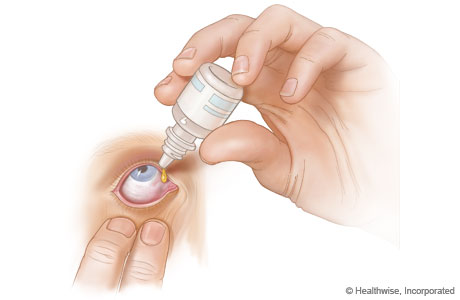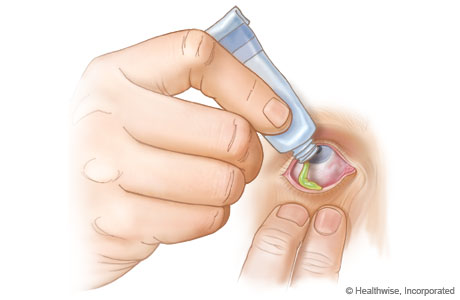Browse Health Information
Search Health Topics
Our Health Library information does not replace the advice of a doctor. Please be advised that this information is made available to assist our patients to learn more about their health. Our providers may not see and/or treat all topics found herein.
Eye Problems: Using Eyedrops and Eye Ointment
Overview
Many eye problems are treated with eyedrops or eye ointments, and sometimes with both.
Even though drops and ointments are widely used, many people don't know the best way to put them in. But with a little preparation, you can comfortably and easily put drops or ointment in your eyes.
- Eyedrops and eye ointments can deliver medicine directly to your eyes, keep your eyes moist, and help with redness, itching, and watering.
- It's important to be sure the dropper or tube is clean. Do not let it touch the eye, eyelid, lashes, or any surface. This will keep it free from bacteria.
- Do not use more drops or ointment than directed.
How to use eyedrops or eye ointment
Eyedrops

- If you are using both eyedrops and eye ointment, put the eyedrops in at least 10 minutes before the ointment.
- If you have an eye infection, don't wear contact lenses while you are using eyedrops, unless your doctor has told you it's okay.
- Using a mirror may make it easier to see what you are doing.
Here are the steps for using eyedrops.
- Make sure you have the correct eyedrops.
Don't use anyone else's drops. If your doctor prescribed one type of eyedrop to treat one problem, don't use the same medicine to treat a different problem.
- Read the directions.
Use the drops exactly as directed. Make sure you understand the directions. Don't use the drops longer or in larger amounts than your doctor tells you to. This can hurt your eyes.
- Wash your hands well.
Always do this before you insert the drops. If you have disposable medical gloves, wear them when you put eyedrops into your eyes.
- Check the eye dropper.
Be sure the dropper is clean. Don't let it touch any surface. Eyedrops that get bacteria in them can easily spread the bacteria to the eye and cause an infection.
- Position your head and the eyedrops.
- With one hand, tilt your head back and pull the lower eyelid down with one or two fingers to create a small pouch.
- With the other hand, position the medicine above your eye.
- Put in the eyedrops.
- Gently squeeze the dropper to put 1 drop in the pouch. Close the eye for 30 to 60 seconds to let the drop absorb.
- If your doctor told you to put more than 1 drop in your eye, wait at least 5 minutes between eyedrops. This helps prevent flushing away or diluting the first drop.
- Don't let the dropper touch the eye, eyelid, or lashes. If the dropper is separate from the bottle and this happens, don't put the dropper back in the bottle. Buy a new dropper at a drugstore.
- Gently squeeze the dropper to put 1 drop in the pouch. Close the eye for 30 to 60 seconds to let the drop absorb.
- Wash your hands.
Wash them even if you wore gloves.
Eye ointment

- If you are using both eyedrops and eye ointment, put the eyedrops in at least 10 minutes before the ointment.
- If you have an eye infection, don't wear contact lenses while you are using the ointment, unless your doctor has told you it's okay.
- Using a mirror may make it easier to see what you are doing.
Here are the steps for using eye ointment.
- Make sure you have the correct ointment.
Don't use anyone else's ointment. If your doctor prescribed one type of ointment to treat one problem, don't use the same medicine to treat a different problem.
- Read the directions.
Use the ointment exactly as directed. Make sure you understand the directions. Don't use the ointment longer or in larger amounts than your doctor tells you to. This can hurt your eyes.
- Wash your hands well.
Always do this before you put in the ointment. If you have disposable medical gloves, wear them when you put ointment into your eyes.
- Check the top of the ointment tube.
Be sure the tube tip is clean. Don't let it touch any surface. Ointment that gets bacteria in it can easily spread the bacteria to the eye and cause an infection.
- Position your head and the ointment.
- With one hand, tilt your head back and pull the lower eyelid down with one or two fingers to create a small pouch.
- With the other hand, position the medicine above your eye.
- Put in the ointment.
- Put a thin line of ointment in the pouch. Close the eye for 30 to 60 seconds to let the ointment absorb.
- Don't let the ointment tube tip touch the eye, eyelid, or lashes. if it does, call your drugstore and arrange to get another tube of eye ointment.
- Wash your hands.
Wash them even if you wore gloves.
Eye ointment can cause some temporary blurring of vision.
Credits
Current as of: October 1, 2025
Author: Ignite Healthwise, LLC Staff
Clinical Review Board
All Ignite Healthwise, LLC education is reviewed by a team that includes physicians, nurses, advanced practitioners, registered dieticians, and other healthcare professionals.
Current as of: October 1, 2025
Author: Ignite Healthwise, LLC Staff
Clinical Review Board
All Ignite Healthwise, LLC education is reviewed by a team that includes physicians, nurses, advanced practitioners, registered dieticians, and other healthcare professionals.
This information does not replace the advice of a doctor. Ignite Healthwise, LLC disclaims any warranty or liability for your use of this information. Your use of this information means that you agree to the Terms of Use and Privacy Policy. Learn how we develop our content.
To learn more about Ignite Healthwise, LLC, visit webmdignite.com.
© 2024-2025 Ignite Healthwise, LLC.

